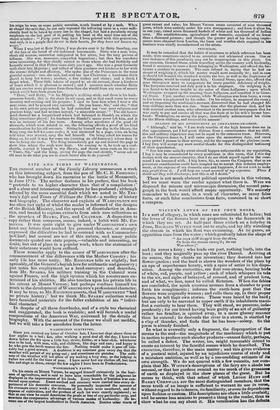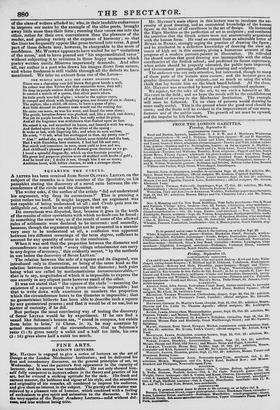WIFFEN'S LOVES OF THE FOUR ROSES,
Is a sort of allegory, in which roses are substituted for ladies ; but the loves of the flowers bear no proportion to the framework in which they are set. At half-past three o'clock on a holyday in June, RICHARD WI FFEN went out to angle, and lay idly watching the stream in which his float was swimming. As he gazes, an apparition rises from the water ; which gradually takes the shape of
"An onyx skiff dropp'd from the skies, Or from the stream emerg'd; its oar Was silver ;"
and its rower a fairy ; who leads our poet, nothing loath, into the boat ; and they magically pass up the river Darent. Arriving at its source, the fay chants an invocation; they descend into her flower-garden ; and the bard is shown the wonders of the place by an ape of superhuman beauty, with a spice of satire in his dispo. sition. Among the curiosities, are four rose-stems, bearing buds of white, red, purple, and yellow ; each of which whispers its tale to the air, and sighs of betrayed, of crossed, and of prudent love, and of what, we fear, must be called flirtation. When the fables are concluded, the apish cicerone arouses from a slumber to pour forth his compliments ; informs the earth-born poet that the flowers were originally women ; and calls them up, in their proper shapes, to tell their own stories. These were heard by the bard; but are only to be narrated to upper earth if its inhabitants mani- fest a curiosity to hear them. They will stand, we presume, inde- pendently; for our friend having been guilty of an act of gallantry rather too familiar, is spirited away, in a more gloomy manner than he entered; he descends the river in a storm, is startled by a clap of thunder, and finds that he has been—asleep. So the poem is already finished.
In what is avowedly only a fragment, the disproportion of the means to the end—the magnitude of the machinery which is put in motion to produce such slender products—cannot fairly, perhaps, be called a defect. The writer, too, might reasonably intend to create an interest by the fanciful scenes which he described. The execution, therefore, is the main matter ; and this gives evidence of a poetical mind, injured by an injudicious course of study and a mistaken ambition, as well as by a too-confiding estimate of its own strength. We do not quarrel with a few conceits, nor com- plain that Mr. WIFFEN'S descriptions of the fairy are a shade too sensual, or that her gardens remind us too much of the grossness of earth as displayed in the show places of the great. But he seems to think, with that school of which Litton HUNT and BARRY CORNWALL are the most distinguished members, that the mere truth of an image is sufficient to warrant its use in verse, without regard to its triteness, its familiarity, or even its dependence upon fashion or custom. His descriptions are often a little overlaid; and he seems less anxious to present a thing to the reader, than te show what he can say about it. His versification has the defects. of the class of writers alluded to; who, in their laudable endeavours to improve our metre by the example of the older poets, brought away little more than their form ; running their verses one into the other, rather for their own convenience than the pleasure of the reader, and gaining variety at the expense of harmony ; so that the lines too frequently appear like prose tortured into verse. A good part of these defects may, however, be chargeable to the score of confidence. Mr. WIFFEN appears to have waited for no" visitations of the muse," and to have poured out "his unpremeditated verse" without subjecting it to revisions in those happy moments which poetry written invi/a Minerva imperiously demands. And after all, our author is a poet who draws his images direct from nature, and whose freshness is still visible through all the defects we have mentioned. We take an extract from one of the Loves— THE PURPLE ROSE AND THE GREEN nascox-rz.r.
There was a charming rose full blown that grew beside a well,
Its colour was that Tyrian dye that monaichs wore, they tell; So deep its purple essence drank the skiey tears of morn,
It seemed a mantle of a queen, that silver pearls adorn.
Its little youth was full of glee : whene'er the zephyr came, It romped and shook with laughing grace, nor dreamt of sin or shame; The zephyr, like a child, oft came, to have a game of play,
And little deemed its pleasant mate would rue the coming day.
He came one morn, as was his wont, and found the stem alone;
The gentle, harmless flower was plucked, and, likes weed, cast down; Not yet its purple breath was fled ; but sadly soiled its grace, And all the fragrance was withdrawn that flushed upon its face.
He raised it up, and smoothed its leaves, and fanned it with his wing,
And dashed upon its dying lips the silver of the spring: It woke at last, with lingering life; and when its eyes unclose, He cried, "0 tell, what has mishapped to thee, my pretty rose ?"
" Alas !" sobbed she, my earliest friend, most faithful and the best, Had I with friendship been content, I had had life and rest ; But mirth and innocence, in turn, must yield to love and wo, And childhood's pleasant paths of flowers grow thornier as we go.
I loved a splendid dragon-fly, which on this fountain prowled; His green and gorgeous pinions were all stubbed with knobs of gold ; And he loved me; I doubt it not, though him I see no more;
Ambition lured, with loftier charms, to seek a stranger shore.



























 Previous page
Previous page